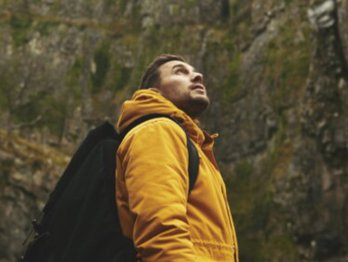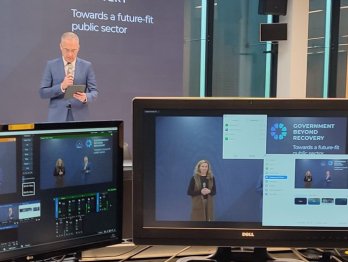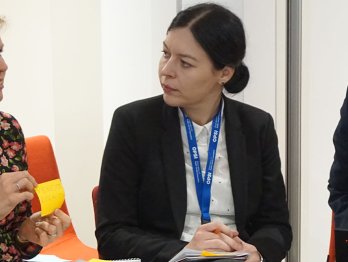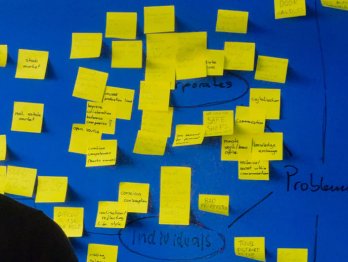COVID-19: Innovative responses update #9

This is our ninth update about innovative responses (including public sector innovation, digital government or open government) being undertaken around the world. Thank you again to all who have contributed in answer to our call and to our partners (including the Centre for Public Impact and GovInsider) for helping us to collect innovative practices. We hope that teams around the world can learn from each other and take inspiration from the information collected. There are now over 420 examples and initiatives in the collection, helping deepen our knowledge and understanding of how the public sector and its partners are responding to one of the most significant crises of recent times.
What can we observe from the additions made since our last update?
- Infection control or tracking measures: in Lithuania a COVID-19 case management system, integrated with the national eHealth system, was established, ensuring that positive laboratory tests instantly start the contact tracing procedure. Meanwhile, African countries created the Africa Medical Supplies Platform, to offer medical supplies like test kits, protective equipment and potential vaccines through a single online marketplace platform.
- Improving communications/providing targeted information: Lithuania built the ‘ViLTė chatbot’ to answer questions about COVID-19 from official sources, and also used drones to aid the targeting messages to particular groups and to monitor compliance and service needs. Estonia also developed a chatbot, ‘Suve’, to provide answers in English, Estonian and Russian to questions in response to the pandemic.
- Service delivery in a crisis/adjusting to context:
- In the area of distance education, the Toronto Foundation in Israel created and funded a distance learning program for high schools that service populations with limited or no access to the internet, using a dial-in phone learning system was set up that connected 500 students with their teachers. Elsewhere, the Romanian Ministry of Education and Services produced a digital platform to provide teachers and pupils with much needed digital tools and skills to continue their learning from home, and for the peer learning of teachers, while in Lithuania, the Vilnius city municipality created platforms for schools to facilitate remote learning and provided touchpads to students who would not have otherwise been able to undertake distance learning.
- Responding to the digital shift, GovTech Lab Lithuania and Digital Academy Lithuania created “Digital Lunch&Learn”, inviting people to spend their Friday lunch break learning something new, useful and to help them prepare themselves for the digital present and future. Also, Enterprise Lithuania created the business support programme ‘There is No Quarantine on the Internet’, bringing together 100 professionals as mentors for businesses that are looking to digitize their activities and 20 partners offering support to make it as easy as possible for the businesses to move into a virtual e-commerce platform. Meanwhile, the Mexican state of Tabasco launched a digital platform and services to help ensure continuity of services to enterprises throughout the crisis.
- In other digital transformational efforts, the European Parliament developed a multilingual remote participation platform to allow Members of the European Parliament to participate from their constituencies, debating and voting in their own languages with interpretation provided locally in Brussels, and the US’ General Services Administration’s Technology Transformation Service (TTS) has transformed to manage pandemic response assistance, including used up to 20% of its talent pool, or 10,000 work hours, to tackle rapid Federal agency pandemic responses.
- Social solidarity and ‘caremongering’: The Vilnius municipality formed the ‘Legion of Gediminas’, a group of 6000 volunteers including to help deliver food for elderly, makers who created face shields, data analysts working with predictions, people to work a mental health line, and collecting medical protection items that were donated. There was also a Lithuanian volunteering platform created by tech and start-up companies, ‘Stiprus Kartu’ (Stronger Together).
- Leveraging and redeploying existing resources and solutions: the ‘Wendá’ platform in Paraguay enables a participatory mapping of people and organizations’ programs, projects, and needs, related to the COVID-19 crisis, helping different groups work together and connecting volunteers to help governments and civil society organizations on the platform in their efforts to continue delivering critical services such as food for vulnerable populations (e.g., communal soup kitchens), emergency loans for small business and job opportunities for the unemployed.
- Open calls, hackathons and other challenge-mechanisms: The Lithuanian government launched the ‘Life-saving Innovations: Stop Covid-19’ challenge to innovators and startups to develop life-saving healthcare innovations and offer solutions based on modern technologies. In the UK, Cambridge University students organised a #CamvsCovid hackathon to help small local businesses.
- Structural responses and possible longer-term shifts: Finland is exploring how to ensure that digital services truly cater to senior citizens, not only during the pandemic but an ongoing basis, through ‘Digital Leap for Seniors’. The National Lottery UK’s Community Fund has created the ‘Emerging Future Fund‘, to help communities move towards recovery and renewal after the impact of COVID-19, and draw on all the creativity seen in communities and across civil society, through funding projects exploring new narratives, perspectives and community storytelling; community foresight and public imagination; and investing in strong signals of transformation. And the district office of Friedrichshain-Kreuzberg in Berlin has opened up 30 streets on Sundays for the creation of temporary playgrounds to give children more space, and drawing up volunteer support from adults in the local area to help supervise the streets.
Reflections and new thinking
While collecting innovative responses, we are simultaneously keeping an eye on the long term. We agree with the idea that this current shock to our system creates a window of opportunity for public sector experimentation with new policies and paradigms. We are repeating this phrase from previous update posts because it bears repeating.
However, as countries transition into deconfinement and relaxed restrictions, this window of opportunity may be overshadowed by the appeal of perceived normalcy and a return to daily life. Even if there are arguments that deconfinement is happening too soon – and recognizing the divide between the general public’s perception of risk and that of epidemiologists.
For this update, we look at a few assessments of possible emerging trends.
Oxford Brookes University’s Jonathan Wheatley points to four:
- The divide in economic and cultural values as we see clear splits in the public’s preferred response to the pandemic, and even splits in the perception of risk and the necessity of pro-social behaviour
- Gender politics as the imbalances and realities of domestic care are brought to light by confinement and remote work, as gender disparities emerge in job loss numbers, and as people raise concerns about domestic abuse in lock-down situations. Meanwhile, others are pointing to those countries considered successful in responding to COVID-19 and noticing a distinct pattern among their heads of state
- The future of the EU as the European Commission launches plans for a 750 billion euro EU Recovery Fund, a decision supported by Germany, which may be a signal of an increased role – and acceptance thereof – for international cooperation and governance
- The revival of regionalism as citizens see a difference between national and local government responses and find service and/solidarity stemming from more granular political spheres.
Rebecca George and Ed Roddis settled on a list of 7:
- Our view of resilience has been recast
- Governments could be left with higher debt after a shock to the public finances
- Debates around inequality and globalisation are renewed
- Lines have blurred between organisations and sectors
- The lockdown has accelerated collaborative technologies
- Civil society has been rebooted and citizen behaviour may change
- The legacy that still needs to be captured.
Of which we will focus on two, starting with resilience: suddenly, citizens have the nature of travel and supply chains as part of their daily consciousness. The procurement and shipping of masks, ventilators, PPE (a term that now rolls off the tongue without need for explanation) is a central policy concern. Support programmes for employees and businesses are of paramount importance, and the ability of governments to respond quickly has been vital. How to learn from the past months and build systems for a world of uncertainty is of paramount importance.
And second, the idea that civil society has been rebooted: it is, perhaps, more so that the capacity and compassion of civil society was brought suddenly and viscerally to light in the wake of the pandemic as community groups rushed to fill spaces left by states who were forced to roll out one-size-fits-most policies. But just as civic interest groups coordinate aid, arrange caremongering groups, and develop open source faceshields, there is also a renewed energy in the civic discourse space. For precisely the reason this section opened with: the window of opportunity to rethink paradigms may be just that, just a window.
Caveat
The innovative initiatives here are represented as best as we can, given the information available. Additionally, these examples are included as observations, with no judgement made about their merits. Innovative responses are, by definition, new, and it takes time to know whether new things work, and if they work, whether they are appropriate or wanted.
If you know of other examples, we want to hear from you
We need your help in continuing to add innovative initiatives to the coronavirus crisis to our tracker and in disseminating the call. This not only helps us to gather data to inform our research and support of governments, but it helps others to share ideas and replicable solutions with others around the world. All our work on this topic will feed into the broader work of the OECD in compiling data, information, analysis and recommendations regarding the health, economic, financial and societal challenges posed by the impact of Coronavirus (COVID-19). Please visit the dedicated page for a full suite of coronavirus-related information.









